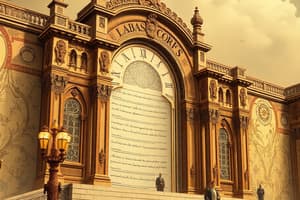Podcast
Questions and Answers
What is the Habeas Corpus Act?
What is the Habeas Corpus Act?
- A declaration of war
- A document that allows for indefinite detention without trial
- A law allowing for the lawful detention of individuals
- An act in which any people unlawfully detained could be prosecuted (correct)
Why did Lincoln suspend habeas corpus?
Why did Lincoln suspend habeas corpus?
Lincoln suspended habeas corpus in response to the rioting by Confederate sympathizers in Baltimore, Maryland.
How was Lincoln's decision to suspend habeas corpus received by the Supreme Court?
How was Lincoln's decision to suspend habeas corpus received by the Supreme Court?
The Congress, not Lincoln, had the power to suspend habeas corpus. Merryman was jailed because Supreme Court justices sided with Lincoln, and this led to the passing of the Habeas Corpus Act in March 1863.
How did the Confederacy view Lincoln's decision to suspend habeas corpus?
How did the Confederacy view Lincoln's decision to suspend habeas corpus?
How was Lincoln's decision to suspend habeas corpus confirmed?
How was Lincoln's decision to suspend habeas corpus confirmed?
Who was President Davis?
Who was President Davis?
Flashcards are hidden until you start studying
Study Notes
Habeas Corpus Act
- The Habeas Corpus Act allows individuals who are unlawfully detained to seek legal remedy.
- It serves as a safeguard against arbitrary detention by the state.
Lincoln's Suspension of Habeas Corpus
- Abraham Lincoln suspended the Habeas Corpus Act in response to civil unrest instigated by Confederate sympathizers in Baltimore, Maryland.
- This decision was aimed at maintaining order during a critical time in the Civil War.
Supreme Court's Response
- The Supreme Court ruled that only Congress had the authority to suspend Habeas Corpus, not the president.
- The Merryman case saw the court siding with Lincoln, but it ended with John Merryman imprisoned.
- This conflict between Lincoln and the Supreme Court led to the passage of the Habeas Corpus Act in March 1863.
Confederate Perspective
- The Confederacy reacted negatively to Lincoln's suspension of Habeas Corpus, believing it was an overreach of power.
- By the end of the Civil War, over 18,000 civilians had been imprisoned as a result of this suspension.
Legislative Confirmation
- Congress confirmed Lincoln's suspension of Habeas Corpus by passing the Habeas Corpus Act in March 1863, legitimizing the president's actions during wartime.
President Jefferson Davis
- Jefferson Davis served as the President of the Confederacy during the Civil War, representing the Southern states' interests and governance.
Studying That Suits You
Use AI to generate personalized quizzes and flashcards to suit your learning preferences.




